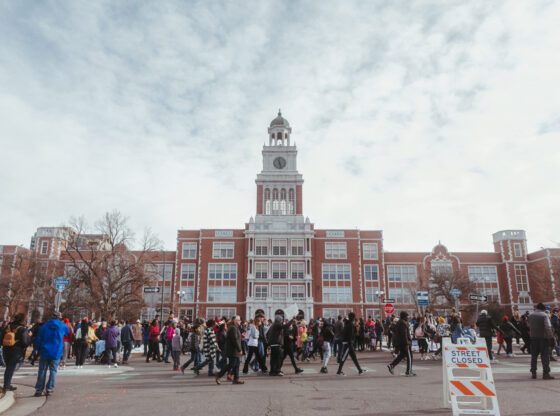This past weekend, 21 educators of Hebrew gathered at a seminar hosted by DU to participate in various talks and programs that, according to the Center for Judaic Studies’ website, strive to ensure a thriving future for the study of Hebrew. They reach for this goal by learning new and innovative teaching strategies and the seminar provides educators with an opportunity to meet with others and discuss their thoughts, in addition to attending talks on specific topics.
This year’s seminar was held at the Holiday Inn Denver- Cherry Creek on Friday evening and Saturday, and for the final portion of the seminar on Sunday morning the participants were brought to DU via shuttle for a talk in Sturm Hall. The weekend consisted of talks and activities, entirely in Hebrew, as well as socializing between participants.
Professor Shmuel Bolozky, the Associate Director for Hebrew language at the National Middle East Language Resource Center (NMELRC) was a co-chair of the event. Bolozky is also a Professor of Hebrew and the Hebrew program coordinator at the Department of Judaic and Near Eastern Studies at the University of Massachusetts Amherst.
According to Bolozky, the first seminar was about 15 or 16 years ago. When it was originally created, the event was annual and lasted for about five days.
“The whole operation started with the federal Title VI grant that the government gives for the National Middle East Language Resource Center, and it takes care of the needs of students, teachers, etc. of Arabic, Hebrew, Turkish and Persian languages,” said Bolozky.
The seminars are intended to bring together college, high school and elementary school teachers of Hebrew from all over the country, according to Bolozky. However, he said that the turnout is dependent on where the seminar is held. Local teachers often attend wherever the seminar is held, which varies by year. However, he said that there is a core of about 15 teachers who attend every seminar.
Three years ago the seminars were discontinued as a result of budget cuts, but thanks to the efforts of DU, the seminar was held once again this year. According to Bolozky and Havis, they are hopeful that either DU or UMass Amherst, if not another university, will provide the shoestring funding necessary to host the seminar next year.
“The seminar couldn’t have happened without this university. There was immense support from the Center for Judaic Studies, OTL and Languages and Literature. They have given us grants even. DU has been a focal point,” said Sari Havis, Hebrew Program Coordinator and DU professor.
According to Bolozky, the Hebrew language department is the only department within the NMELRC that has these types of professional development seminars.
“Teachers were very pleased,” said Bolozky. “They look forward to it every year. They have a common goal and learn quite a lot from each other. If not mostly through lectures and interactions, also socially and through exchanging each other’s teaching methodologies.”
Each year, the seminar has a different theme, and according to Bolozky, many past workshops have focused on the American Council for the Teaching of Foreign Languages’ (ACTFL) emphasis on proficiencies with writing, reading, and listening.
“Speaking is considered to be of prime importance. If you can’t communicate, you can’t go further,” said Bolozky.
Additionally, this year’s seminar had a stronger emphasis on culture in the Hebrew language classroom according to Havis.
“The whole weekend was really culture: songs, films, biblical Hebrew and culture in the Bible, and how it can be applied in Hebrew language classes,” said Havis.
The seminar is devoted to professional development of teachers. Bolozky said that participants appreciate the insight that they can gain from each other as well as from the speakers.
“I learn a lot from these people. From all these years, there is no difference in the intellectual curiosity and performance and insight by college teachers, high school teachers or elementary teachers and it’s all a high level. So we are hoping to continue.”
The seminars have evolved over the years to adapt to new teaching styles and media, according to Bolozky. He said that this reflects a shift to proficiency-oriented teaching. The classes had previously been primarily text-based, which was not geared enough towards oral and listening proficiency, but use of video material to aid in the learning process currently provides a more complete context for students.
“We discuss a lot of the role of culture in teaching, based mostly on modification of ACTFL guidelines in where to gear our goals and what texts to use,” said Bolozky.
According to Bolozky, every meeting has a main topic and is led by an expert in the field who functions as a keynote speaker and trainer.
“I think a strength of the seminar is the cohesion that this group has formed outside of the seminar to collaborate with each other,” said Bolozky.
Havis said that the attendees gain new insight into teaching from the seminar, and each teacher brings unique ideas.
“We see that they leave with a very strong support system and enrichment,” said Havis.











